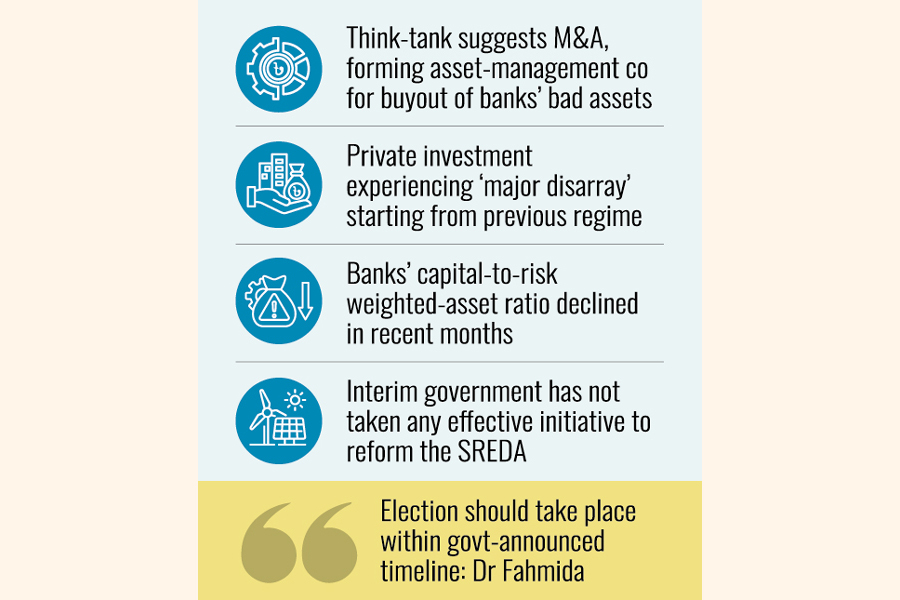
Published :
Updated :

Interim government's inability to curb vices like extortion, hoarding and price manipulation of essentials results in persistent inflation, says a CPD review report on the state of economy and banking.
The policy think-tank thinks without bold and urgent measures to restore good governance in the food-supply chain, bringing down inflation will remain a far cry.
It comes to the conclusion that necessary economic reforms to heal the ills cannot be effected without political reforms.
Economists at the Centre for Policy Dialogue (CPD), the country's oldest think-tank, made these observations during a media briefing titled 'CPD (2025): Bangladesh Economy 2024-25: Challenge of Meeting Expectations in Critical Times' at its city office Wednesday.
Responding to a question, CPD Executive Director Dr Fahmida Khatun said the interim government had already announced that the national elections will be held by either December this year or June 2026. "The election should take place within this period."
Responding to a volley of questions from the media people at the function, she noted that economic reforms cannot be achieved without political reforms.
"Despite the change in power, economic trends have not improved. Revenue-collection growth till October was only 3.7 per cent, compared to over 17 per cent in the same period a year earlier," she said, citing Ministry of Finance data.
"To achieve the total revenue target for FY2025, the remaining period of the fiscal year would require a 45.1-percent growth, which is highly unrealistic."
Overall tax-revenue collection saw a negative growth.
Meanwhile, budget implementation till October stood at 18.1 per cent, up from 16.0 per cent in the same period last year.
However, the implementation rate of the Annual Development Programme (ADP) was 6.1 per cent, down from 8.9 per cent in the corresponding period of the previous fiscal year.
The CPD also notes that Bangladesh is unlikely to succeed in postponing its LDC- graduation deadline.
Distinguished Fellow of the CPD Dr Mustafizur Rahman remarked that while some local groups have been urging the government to seek an extension, this may not be feasible.
"It is true that the three key indicators determining a country's eligibility for LDC graduation have slightly declined since 2021. However, we believe they will remain surplus, making it highly unlikely to defer the November-2026 deadline," he said.
Defending the IMF from criticism, Dr Rahman clarified that the multilateral institution did not instruct the National Board of Revenue (NBR) to raise value-added tax (VAT). "The IMF recommended increasing tax collection by 0.5-percentage points annually to improve the tax-to-GDP ratio."
In the wake of criticism about hike in indirect taxes like VAT and SD that affect all across the board, the economist highlights that direct tax accounts for only one-third of total-tax revenue in Bangladesh, which should ideally be at least half.
"This is the right time to eliminate tax discrimination," he says about reform in fiscal-policy measures.
Dr Rahman also points out that inflation remains high in rural areas, eroding the real wages of low-income individuals.
While presenting her paper, Dr Fahmida Khatun said Bangladesh's energy sector is facing a severe financial crisis, largely due to the policies of the previous government. The crisis has impacted government institutions as well as the National Board of Revenue.
"The power and energy sector is trapped in a vicious cycle of debt," she said.
The CPD report notes that power-generation capacity slightly declined in the first half of FY2025 owing to periodic shutdowns of fossil fuel-based power plants.
Over the last six months, no new rental-or quick-rental fossil fuel-based power plants have been commissioned.
Currently, gas and LNG dominate Bangladesh's energy mix with a 43-percent share, while renewable energy contributes only 4.0 per cent.
The think-tank laments that renewable-energy integration has made little progress.
The government has announced that the Bangladesh Energy Regulatory Commission (BERC), rather than the government itself, will determine oil, gas, and electricity prices through public hearings. However, the interim government has not taken any effective initiative to reform the Sustainable and Renewable Energy Development Authority.
The CPD notices private investment experiencing major disarray during the tenure of government which actually started in the previous regime.
The SMEs are facing higher interest rates, making their financial burden disproportionately high. Citing findings on the much-talked-about banking sector, the CPD said the capital- to- risk weighted-asset ratio has declined in recent months. "The overall ratio declined from 10.64 per cent in June to 6.86 per cent in September in 2024.
The think-tank suggests mergers and acquisitions of banks as a remedy for the ailing lenders. An asset-management company may be formed for the buyout of bad assets.
jasimharoon@yahoo.com


 For all latest news, follow The Financial Express Google News channel.
For all latest news, follow The Financial Express Google News channel.